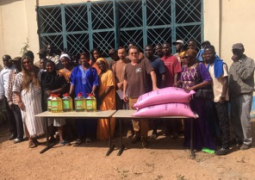
Elizabeth Sloane has been working with ECOWAS and Caricom states to develop their abilities to not only feed their people but improve the value chain. They have participating in several National Agriculture Development Strategy Plannings and are ready to do that for as many ECOWAS states.
Agriculture plays a crucial role in transforming economies, along with achieving other essential development goals like ensuring food security, reducing poverty and improving nutrition.As a result of this, in order to end hunger and undernutrition while accelerating economic growth, agricultural transformation must become a reality.
The countries that achieved high-incomestatus, started with agriculture and went through an economic transformation that accelerated growth and reduced hunger and under nutrition. For example, China’s rapid growth in GDP per capita in current US dollars from $155 to $8,123 between 1978 and 2016 was due to this kind of transformation. Jamaica is currently doing a similar thing.
Economic transformation—means a country’s shift in the relative contribution of sectors to its overall Gross Domestic Product (GDP): From traditional technology to modern technology and from agriculture to industry and manufacturing, and then to a high-income service economy. For this process to be successful, the agricultural sector must be boosted, modernizsed and innovated.
Agricultural modernization prepares conditions for industrialization by boosting labour productivity, increasing agricultural surplus to accumulate capital, and increasing foreign exchange via exports. Modernisation also helps achieve humanitarian goals by raising incomes and productivity of poor farmers, lowering food prices, and improving nutrition. Indeed, modernising agriculture can improve human capital by better nourishing the population and avoiding far-reaching debilitative outcomes of malnutrition such as child stunting. Overall, a well-nourished child develops better and becomes more productive and receives higher wages later in life than a child who grew up malnourished: A nutrition intervention in South America led to a 46 percent increase in wages for these children as adults above those who did not receive the intervention. Improving nutrition creates a virtuous cycle that helps propel further economic transformation. Increased agricultural productivity and income increases consumers’ ability to purchase manufactured goods and invest in the modernisation of agriculture.
As agriculture becomes more productive, excess labour moves from rural farm jobs to urban manufacturing jobs. While the result of this stage is a decreased share of agriculture to GDP and the labour force, the process of agricultural modernisation is critical for economic transformation and achieving food security and improved nutrition.
When asked, Melanie Wynter stated "There are two key areas to make agricultural transformation a reality. First, it is critical to make modern technologies available. While modern agricultural technologies can come from private and public sectors, national governments need to play a big role in investing in agricultural research and development (R&D). Next key area for agricultural transformation is training: both technical and business training for agriculture practitioners.Therefore, governments must prepare conditions needed through planning, policies and strategy development."
Melanie Wynter, has released her email (mwynter@elizabethsloane.com) asking anyone interested in agriculture Development to reach out, to start the discussion.
Read Other Articles In National News

Gambia to strengthen fiscal management for better public service delivery
Jun 23, 2020, 12:02 PM




